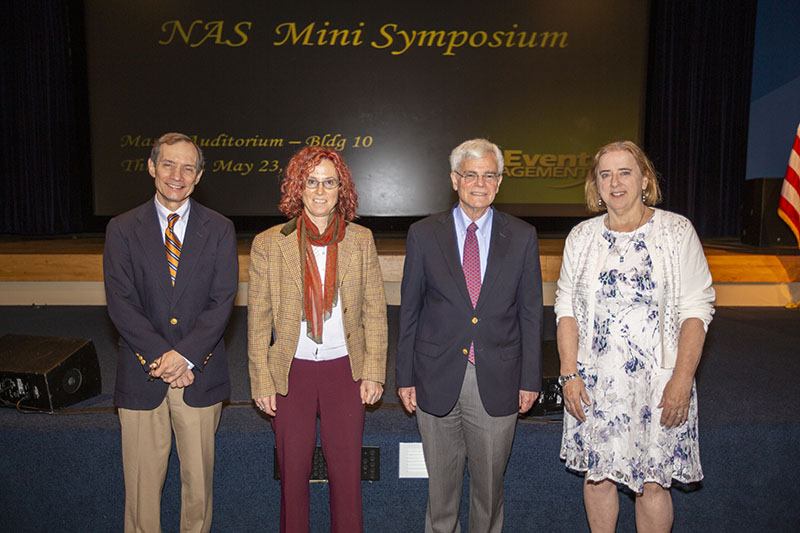National Academy of Sciences
Mini Symposium: Celebrating NIH’s Newest Members

CREDIT: BEN CHAMBERS, OIR
A mini symposium was held in May, featuring the four newest elected members of the National Academy Sciences. From left: Michael Lenardo (elected in 2019), Clare M. Waterman (elected in 2018), Michael Gottesman (elected in 2018), and Elaine A. Ostrander (elected in 2019)Cell migration, anti–cancer drug resistance, dogs and their genes, and a gene discovery that led to a treatment for a congenital immune disorder were the topics presented by the four recently elected members of the National Academy of Sciences (NAS) at a mini symposium, held on Thursday, May 23,2019, in Masur Auditorium (Building 10).
The NAS is a private, nonprofit society of distinguished scholars. Established by an Act of Congress and signed by President Abraham Lincoln in 1863, the NAS is charged with providing independent, objective advice to the nation on matters related to science and technology. Scientists are elected by their peers to membership in the NAS for outstanding contributions to research. The NAS is committed to furthering science in America; its 2,347 members and 487 foreign associates are active contributors to the international scientific community.
The mini symposium honored the work of NIH’s newest NAS members: two elected in 2018, Clare Waterman (NHLBI) and Michael Gottesman (NCI-CCR), and two elected in 2019, Elaine Ostrander (NHGRI) and Michael Lenardo (NIAID). The number of current NIH colleagues who have been elected to the prestigious NAS is 47.
Below is a summary of their presentations.
Clare M. Waterman, Ph.D.
NIH Distinguished Investigator and Director, Cell and Developmental Biology Center, National Heart, Lung, and Blood Institute
“The Molecular Clutch: Integrating Actin Dynamics and Adhesion in Cell Migration”
Clare Waterman described her research on the “dance” of cell migration. She has made seminal contributions to the understanding of the molecular and biophysical mechanisms of cell migration in development and disease. She pioneered the direct determination of protein organization and motion in living cells. In addition, she invented and used novel light-microscopy methods to define nanometer-scale architecture and dynamics of the molecular assemblies that generate, organize, and transmit forces that drive cell movement.
Michael Gottesman, M.D.
Deputy Director for Intramural Research; Senior Investigator, Laboratory of Cell Biology, Center for Cancer Research, National Cancer Institute
“The Clinical Relevance of Mechanisms of Anti-Cancer Drug Resistance”
“Most effective therapies for cancer cease to work after a while,” said Michael Gottesman, who has conducted pioneering research into improving cancer treatments, especially against cancer cells resistant to chemotherapy. His lab identified and cloned the first human ATP-binding cassette transporter and showed that it conferred multidrug resistance by energy-dependent efflux of hydrophobic natural-product drugs. Subsequently, other members of this transporter family were shown to impart broad-spectrum multidrug resistance. During his talk, he presented recent data pointing to the clinical contribution of multidrug transporters to anti–cancer drug resistance.
Elaine A. Ostrander, Ph.D.
Chief and NIH Distinguished Investigator, Cancer Genetics and Comparative Genomics Branch, National Human Genome Research Institute
“Dogs and Their Genes: Man’s Best Friend to the Rescue!”
Elaine Ostrander is a pioneer in the field of comparative genomics, having initiated the canine genome project in 1993. Each of the over 450 breeds of domestic dogs, which are all are members of the species Canis lupus familiaris, is characterized by morphologic and behavioral features as well as disease susceptibility. To understand the underpinnings of this enormous genetic diversity, Ostrander’s lab has assembled and analyzed the largest and most diverse dataset of dog breeds to date. She has shown that most breed-defining traits, such as body size and leg length, are controlled by small numbers of genes. Similar variants are observed in humans but present a very different scenario and can be associated with disease. For example, mutations in growth genes in dogs are associated with obesity in humans; genes that determine the shape, size, and orientation of dog ears are associated with genes that play a vestibular role in the human inner ear; and genes in terriers that determine hyperactivity are associated with human genes linked to schizophrenia, autism, and other conditions in humans.
Michael Lenardo, M.D.
Chief, Molecular Development of the Immune System Section, Laboratory of Immune System Biology, and Director, Clinical Genomics Program, National Institute of Allergy and Infectious Diseases
“Gene Discovery Yields Precision Medicine Therapies for Congenital Immune Disorders”
Michael Lenardo’s research is helping to define genetic diseases of the immune system. He studies the molecular regulation of T lymphocytes, particularly as it relates to immunological tolerance, apoptosis, and autoimmune diseases such as multiple sclerosis and type 1 diabetes mellitus. He uses contemporary genomic approaches to discover the molecular basis of new genetic diseases of the immune system, as well as to develop new techniques for treating autoimmune conditions. Genomics coupled with biochemical investigation has allowed the molecular definition of a growing number of new genetic diseases and revealed new concepts of immune regulation. Defining the genetic pathogenesis of these diseases has led to improved diagnosis, prognosis, genetic counseling, and, most importantly, new therapies. For example, in 2017, his lab identified a genetic cause and a possible treatment for CHAPLE disease, a rare and potentially fatal autoimmune disorder. He found that the drug eculizumab could reverse the disease—a “remarkable change from death’s doorstep,” he said.
To watch a videocast of the NAS Mini Symposium, held on May 23, 2019, go to https://videocast.nih.gov/launch.asp?27568 (NIH only).
This page was last updated on Monday, April 4, 2022
